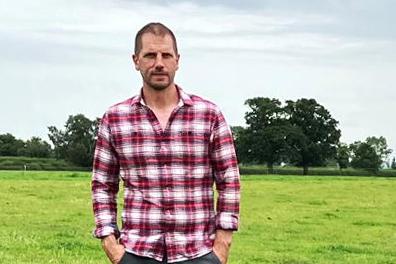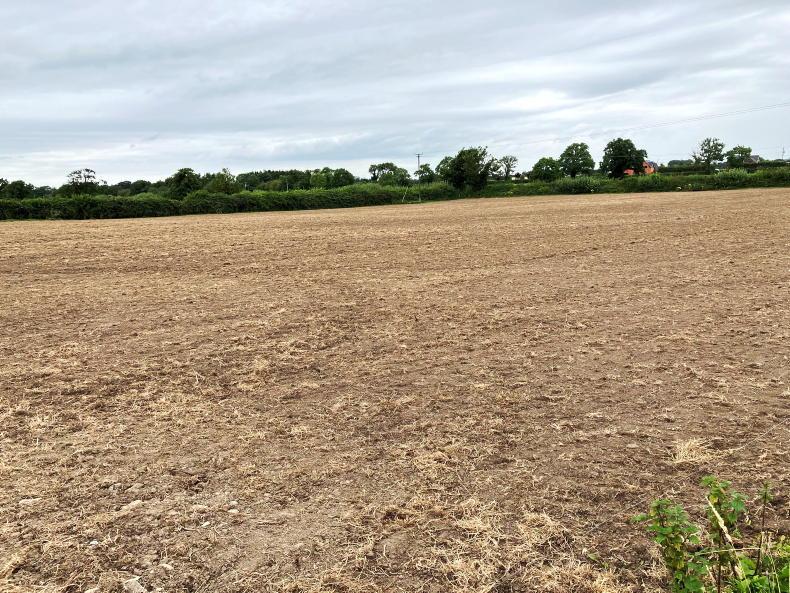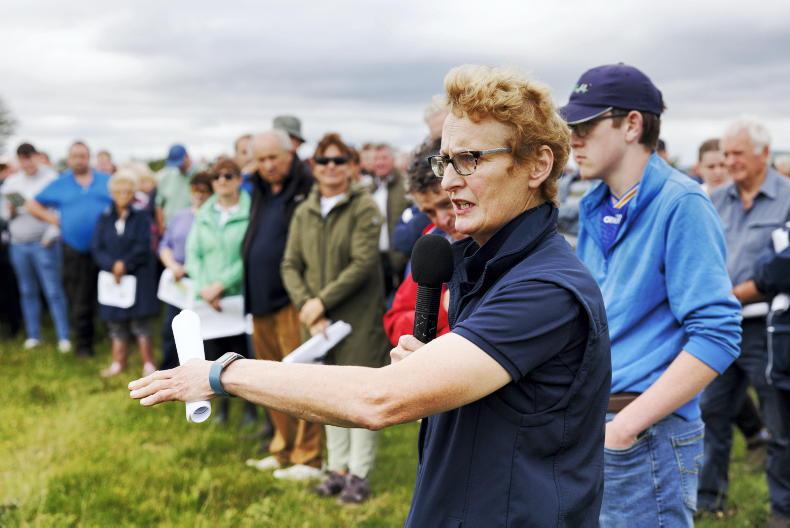As weeds began to take over and grass growth dwindled in a paddock beside the yard, beef and tillage farmer Andrew Mulhare decided it was time he tried out the multispecies sward (MSS) mix and reseed this one field.
Towards the end of July, the Irish Farmers Journal paid a visit to Andrew’s farm in Co Laois.
Andrew plans to monitor the growth of the sward carefully. He used the Government grant for MSS establishment to do this.
Andrew is looking forward to trying out the mix on his farm, seeing how it goes and if it will work well for him on his soil type and the suckler system he operates.
Perennial ryegrass (Meiduno) - 3.3kg.Perennial ryegrass (Aston King) - 3.3kg.Timothy – 0.7kg.Red Clover – 1.5kg.White Clover – 1.5kg.Plantain – 1kg.Chicory – 0.7kg.Sowing multispecies offers several benefits
Multispecies swards include a mix of grasses, legumes, and herbs, enhancing biodiversity and creating a more resilient ecosystem. The swards support pollinators and other beneficial insects, promoting ecosystem services like pollination and biological control, which is important to Andrew’s tillage system to help reduce risks of barley yellow dwarf virus for example.
The diverse root systems of different plant species improve soil structure, enhance nutrient cycling, and increase organic matter content which can enhance carbon sequestration, contributing to climate change mitigation. Andrew’s farm is located on high ground with good drainage, MSS benefits from the drought tolerance of deep-rooting herbs like plantain and chicory.
Given the increasing frequency of prolonged dry spells and unpredictable rainfall, it’s crucial to have parts of the farm resilient to drought.
MSS measure
For the past few years, Andrew selected the multispecies sward measure on his BISS application but never managed to sow it. This year, he made it his goal. This meant he was eligible for €300 per hectare of multispecies sward sown. The field is just over one hectare in size and a minimum of 1ha is required for the scheme. Andrew struggled to find a seed mix that met the scheme’s requirements. After extensive searching, he finally found one that meant he was eligible.

If the multi-species works out well, Andrew plans to sow other fields using his own equipment.
The Department of Agriculture specified that the seed mix must include six species. For a 12kg bag, the minimum quantities are as follows:
Perennial ryegrass (PRG): 6.6kg.Timothy or other non-PRG grass: 0.7kg.White clover: 1.5kg. Red clover: 1.5kg.Plantain: 1.0kg. Chicory: 0.7kg.Sowing process
After a tight grazing, the Laois farmer put the sprayer on and sprayed off the weeds. It was left for 10 days before he used a disc across the field twice in different directions.
A compound fertiliser of 10:5:25 that was left over from his tillage crops was spread at a rate of 2.5 bags per acre and the contractor used a one pass to sow the seed the following day. Andrew also rolled the field after this to ensure good soil-seed contact.
If the multispecies works out well he plans to sow other fields using all his own equipment and a broadcast spreader.
When the sward is well established, Andrew will graze the field with some light weanlings before the end of the year.
Outlook for grazing
If growth conditions allow he may even get more than one round of grazing done before closing the field for the winter. Andrew is worried about the lack of clover and multispecies safe sprays to control the weeds. As it is a small paddock, he plans to pull or top any weeds that appear in the pasture.
Soil test
The soil test results are in the optimum range for soil pH, P and K for the field where the multispecies was sown.The field has a high soil pH.Andrew is giving the MSS every chance to succeed in a field at optimum levels for soil pH, P and K.Andrew will try and cut artificial nitrogen completely from the sward. In the springtime, slurry may provide enough N to get grass growing before the soil warms up and clover starts to fix nitrogen next season.Name: Andrew Mulhare.Farm location: Ballybrittas, Co Laois.Farm size: 54ha.Enterprise: Suckler beef and tillage.Schemes: SCEP, ACRES, Protein Aid Scheme, Straw Incorporation Measure.
As weeds began to take over and grass growth dwindled in a paddock beside the yard, beef and tillage farmer Andrew Mulhare decided it was time he tried out the multispecies sward (MSS) mix and reseed this one field.
Towards the end of July, the Irish Farmers Journal paid a visit to Andrew’s farm in Co Laois.
Andrew plans to monitor the growth of the sward carefully. He used the Government grant for MSS establishment to do this.
Andrew is looking forward to trying out the mix on his farm, seeing how it goes and if it will work well for him on his soil type and the suckler system he operates.
Perennial ryegrass (Meiduno) - 3.3kg.Perennial ryegrass (Aston King) - 3.3kg.Timothy – 0.7kg.Red Clover – 1.5kg.White Clover – 1.5kg.Plantain – 1kg.Chicory – 0.7kg.Sowing multispecies offers several benefits
Multispecies swards include a mix of grasses, legumes, and herbs, enhancing biodiversity and creating a more resilient ecosystem. The swards support pollinators and other beneficial insects, promoting ecosystem services like pollination and biological control, which is important to Andrew’s tillage system to help reduce risks of barley yellow dwarf virus for example.
The diverse root systems of different plant species improve soil structure, enhance nutrient cycling, and increase organic matter content which can enhance carbon sequestration, contributing to climate change mitigation. Andrew’s farm is located on high ground with good drainage, MSS benefits from the drought tolerance of deep-rooting herbs like plantain and chicory.
Given the increasing frequency of prolonged dry spells and unpredictable rainfall, it’s crucial to have parts of the farm resilient to drought.
MSS measure
For the past few years, Andrew selected the multispecies sward measure on his BISS application but never managed to sow it. This year, he made it his goal. This meant he was eligible for €300 per hectare of multispecies sward sown. The field is just over one hectare in size and a minimum of 1ha is required for the scheme. Andrew struggled to find a seed mix that met the scheme’s requirements. After extensive searching, he finally found one that meant he was eligible.

If the multi-species works out well, Andrew plans to sow other fields using his own equipment.
The Department of Agriculture specified that the seed mix must include six species. For a 12kg bag, the minimum quantities are as follows:
Perennial ryegrass (PRG): 6.6kg.Timothy or other non-PRG grass: 0.7kg.White clover: 1.5kg. Red clover: 1.5kg.Plantain: 1.0kg. Chicory: 0.7kg.Sowing process
After a tight grazing, the Laois farmer put the sprayer on and sprayed off the weeds. It was left for 10 days before he used a disc across the field twice in different directions.
A compound fertiliser of 10:5:25 that was left over from his tillage crops was spread at a rate of 2.5 bags per acre and the contractor used a one pass to sow the seed the following day. Andrew also rolled the field after this to ensure good soil-seed contact.
If the multispecies works out well he plans to sow other fields using all his own equipment and a broadcast spreader.
When the sward is well established, Andrew will graze the field with some light weanlings before the end of the year.
Outlook for grazing
If growth conditions allow he may even get more than one round of grazing done before closing the field for the winter. Andrew is worried about the lack of clover and multispecies safe sprays to control the weeds. As it is a small paddock, he plans to pull or top any weeds that appear in the pasture.
Soil test
The soil test results are in the optimum range for soil pH, P and K for the field where the multispecies was sown.The field has a high soil pH.Andrew is giving the MSS every chance to succeed in a field at optimum levels for soil pH, P and K.Andrew will try and cut artificial nitrogen completely from the sward. In the springtime, slurry may provide enough N to get grass growing before the soil warms up and clover starts to fix nitrogen next season.Name: Andrew Mulhare.Farm location: Ballybrittas, Co Laois.Farm size: 54ha.Enterprise: Suckler beef and tillage.Schemes: SCEP, ACRES, Protein Aid Scheme, Straw Incorporation Measure. 










SHARING OPTIONS